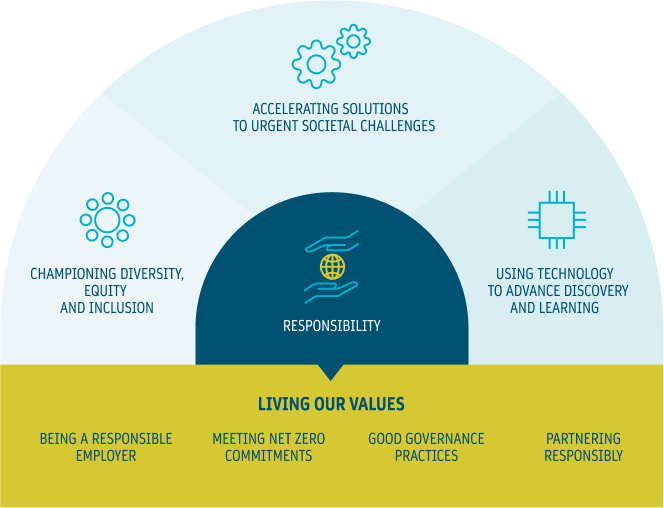Our sustainable business strategy
Our sustainable business strategy is based on one of Springer Nature’s core values: responsibility. We want the work we do to do good in the world. Sustainability is crucial to delivering our business vision.
We are unlocking the potential of open science and research across all disciplines to accelerate solutions to the world’s urgent challenges and improve the lives of generations to come.
Our sustainable business strategy is based on one of Springer Nature’s core values: responsibility. We want the work we do to do good in the world. Sustainability is crucial to delivering our business vision.


We do the right thing for all our communities and champion diversity and inclusion. We act as a responsible business, driving sustainable progress and recognising the ideas and opinions of all.

Increasing representation in our organisation, content and external communities.

Content and events that make a meaningful difference to the Sustainable Development Goals.

Deploying advanced technologies responsibly to open doors to discovery.
“Academic and editorial communities facilitate knowledge exchange, encourage global dialogue and identify solutions to worldwide issues – all essential components for realising the SDGs. Our role is to ensure researchers and editors know the impact they can have, and that the world sees the effects of their work.”


We amplify sustainability research, sharing it widely so that it can have maximum impact within the research community, for our own employees and in wider society. Our education business also invites students of all ages and abilities to create and share their vision for a fairer, more sustainable future through its Changemakers programme and its broader work preparing and sharing learning resources.

Across our content and communities, we work to accelerate conversations around gender equality in science and research as well as wider society. Our Her Research, Our Future campaign in 2023 reached more than 1,000 female researchers in India, empowering them to make a difference and inspire the next generation.

Inequality is a major obstacle to sustainable development. We look to highlight actions that can be taken to improve inclusion across the world and in our communities. Communications Biology hosted a six-week editor training programme for more than 150 academic trainees to improve representation in the peer reviewer and editorial talent pipeline.

We publish the latest climate research, manage our operational impacts and are working to become net zero by 2040. Examples of our efforts can be found throughout our Sustainable Business Report 2023 (PDF 9MB), and specifically in the Acting on carbon section.

We have sought new partnerships to link research and interdisciplinary experts with those making key decisions. This includes collaborating on the Sustainable Development Knowledge Cooperative, hosted by Kudos.
1,000+ colleagues took part in our 2023 SDG Impact Challenge, collectively saving 243 tonnes of carbon.

Convened several international SDG events, including 800+ attendees at our annual Science for a Sustainable Future series.

Fifth anniversary of the China New Development Awards recognising Chinese author contributions to progressing the SDGs.

Around 54% of our SDG-related journal articles were OA (up 137% from 2015).

450+ colleagues volunteered in SDG working groups on projects to advance the goals.

SDG articles published in 2023 were downloaded more than 123 million times.
